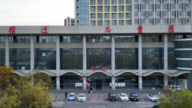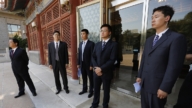【新唐人2011年11月24日讯】中国大城市上个月房产交易量同比下降39%,已跌到“危险的低水准”。目前中国银监会还没有发布银行贷款在房地产价量齐跌下的压力测试结果,中国经济学者綦彦臣认为,银监会并没有考虑到交易量下降和房价下跌,对银行的抵押品和相关产业链的影响。
英国《金融时报》22号报导,根据中共当局公布的数据,10月份中国15个最大城市的房产交易量同比下降39%。全中国,10月房产交易量同比下降11.6%,降幅超过了9月份的7%。
分析师指出,原因很简单:因为潜在置产者认定房价还会继续下跌,所以他们宁愿持币观望。加上房地产交易量下降已经影响到开发商的现金流,在某些情况下,还影响到他们偿还银行贷款的能力。
中国经济学者綦彦臣则认为,一旦中国房地产业陷入萧条,和房产相关的产业链,尤其是水泥和钢铁等都会受到拖累,而造成中国银行金融系统的压力过大。
中国经济学者綦彦臣:“水泥和钢筋产业,如果房地产价格下挫以后,这两个相关的产业要受到影响,这两个产业的运行也是基本靠银行贷,款宽松货币政策支撑起来的,所以中国房地产下挫了,房地产开发商没能力支付钢筋生产商,没能力支付水泥供应商,这代表这两个分支产业还款能力也下降了。”
国际货币基金组织(IMF)稍早针对中国17家大型银行进行压力测试,并在11月16号发布评估报告,结果发现中国银行业存在一定的脆弱性,无法一次面临多种压力冲击,国际货币基金组织提出警告,由于银行业借贷活动太过泛滥,中国银行面临系统性的风险升高。
对此,綦彦臣认为,从国际货币基金组织的报告可以看出,中国银行和金融系统的脆弱性正逐渐增加。
綦彦臣:“为什么说脆弱性增加? 就是大量的银行信贷资金被房地产这个行业套住,中国社会方面的融资情况、融资秩序会越来越坏,甚至可能引爆一些大规模的社会事件,(比方)高利贷,房地产市场不仅仅是拿到银行的贷款,而且他相当一部分,是来自于民间的资金,比方说,你我的存款,经过好朋友投到房地产商这边去了,所以现在跑路的老板不仅仅是那些生产鞋帽这些实体,而且还有许多房地产商。”
今年4月,中国银监会要求各银行按照房价下跌50%、交易量下降30%的情形,对各自的贷款账簿进行压力测试。截至目前,中国银监会还没有发布压力测试结果,并拒绝置评。綦彦臣指出,这涉及中国官方经济数据不透明的惯性。
中国经济学者 綦彦臣:“这是中国政府管理经济的一种习惯,中国金融是国家垄断,没有民间介入这个东西(概念),即便有好多担保公司,他(中国银监会)也没有能力测算这个东西(压力测试)。”
房地产建设在中国经济中所占比重超过13%,尽管北京一直在试图遏制高涨的房价,綦彦臣认为,中国房地产行业正在下行阶段,房地产泡沫正在破灭,部分一线城市,例如京沪等地的房价恐怕还会下落。
新唐人记者梁欣、林平、王明宇采访报导。
Drastic Decline in Property Transactions Raises Risk in Other Business
Last month property transactions in Chinese cities
were down 39%, a “dangerously low level."
The China Banking Regulatory Commission has yet to
release the stress test results of declined bank loans and housing prices.
Economist Qi Yanchen believes that it is because the
Banking Regulatory Commission neglects to consider the impact that
decreased bank loan volumes and housing prices would have
on collateral and other bank related businesses.
The UK “Financial Times" reported on the 22nd, “In October,
however, property transactions fell 39% year-on-year in
China’s 15 biggest cities, according to government data.
Nationwide, transactions dropped 11.6 per cent,
accelerating from a 7 per cent fall in September."
It was analyzed that, “The fall-off in transactions has
affected developers’ cash flows and, in some cases, their ability to repay bank loans."
Chinese economist Qi Yanchen Qi believes that
once the Chinese property industry falls into a depression,
related industrial chains, especially cement and steel will suffer.
Consequently, the pressure on the Chinese banks
will be overwhelmingly large.
Chinese economist Chen Qi Yan: “Cement and steel will be
the two industries suffering from the declined property values.
The operation of these two industries basically relies on
bank loans and a loose monetary policy.
Therefore, with the declined property industry,
the developers won’t be able to afford the steel, and
the cement manufacturers can not afford to pay suppliers;
which represents the pay back ability of these two branches has also declined."
International Monetary Fund (IMF) earlier conducted stress
tests of the largest 17 commercial banks and released its evaluation report on November 16.
It reported, “China confronts a steady buildup of
financial sector vulnerabilities," and “If several of these risks were to occur at the same time,
however, the banking system could be severely impacted."
IMF warned of domestic risks due to “the rise of off-balance
sheet exposures and of lending outside of the formal banking sector."
Qi Yanchen believes that the IMF report showed the
Chinese banks and financial system are increasingly vulnerable.
Qi Yanchen: “Why is the vulnerability increased?
It is because a lot of bank credit money is trapped by the real estate industry.
The finance and financing order in the Chinese society are
getting worse and may even set off a number of large-scale social incidents, (for example) usury.
The real estate market will not just get a bank loan,
but also considerable amount of private funds,
for example, the savings from you and me might
have been invested in real estate through a good friend.
Therefore, nowadays it’s not just the manufacturer of shoes
who would run away, but also the many real estate businessmen."
FT indicated, “In April the CBRC told banks to test
their loan books against a 50 per cent fall in prices, and also a 30 per cent fall in transaction volumes."
Up to now, CBRC has yet to release the results or comment.
Qi Yanchen pointed out that this is just a custom of the
opaque official economic data of the regime.
Chinese economist Qi Yanchen: “This is the managerial habit
of the Chinese government. The Chinese finance is state monopolized.
There is no such a thing as civic involvement, even though
there are many security companies, the CBRC is not capable of doing the evaluation (stress tests)."
Real estate construction shares are up 13% in China’s economy,
although Beijing has been trying to curb the rising prices.
Qi Yanchen believes that China’s real estate industry
is going down and the real estate bubble is bursting,
in some first-tier cities such as Beijing and Shanghai,
property prices will probably continue to fall.
NTD reporters Liang xin, Lin Ping and Wang Mingyu.



























